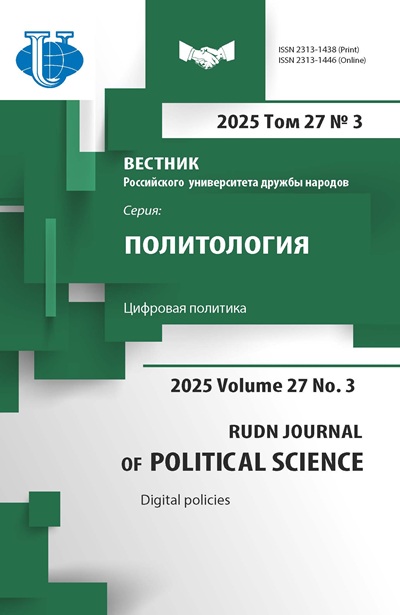Turkey’s Strategies for Ensuring Digital Security and Regulating Media Landscape
- Авторлар: Avatkov V.A.1, Mishin L.D.1
-
Мекемелер:
- Institute of Scientific Information on Social Sciences of the Russian Academy of Sciences
- Шығарылым: Том 27, № 3 (2025): Digital policies
- Беттер: 579-589
- Бөлім: DIGITAL SOVEREIGNTY
- URL: https://journal-vniispk.ru/2313-1438/article/view/348837
- DOI: https://doi.org/10.22363/2313-1438-2025-27-3-579-589
- EDN: https://elibrary.ru/MSIFJY
- ID: 348837
Дәйексөз келтіру
Толық мәтін
Аннотация
The Republic of Turkey has demonstrated a significant increase in influence on the world stage over the past decade, and the rise of information security ambitions has not been lost on the Republic of Turkey either. Turkey is currently at the forefront of digital and information initiatives in the Middle East. Not the least place in the country’s news reports is occupied by news of blocking and acts of active regulation of Internet and traditional media, which are of growing concern to Turkish society. The research paper discusses in detail the historical background, legal basis, current state and trends in approaches to ensuring digital and information security in Turkey, as well as the regulatory function of the state in relation to the Internet and media. As a methodological basis for the study, a case study of specific examples was used, setting up the Turkish leadership to be directly involved in the processes of regulating the information space and media. In addition, a content analysis was conducted, supported by a study of the statutes of the main regulatory structures in Turkey. Key articles and monographs by leading Turkish scholars in the fields of jurisprudence, information security and its history were also studied. It was revealed that one of the main reasons for the strengthening of control over the information space was the targeting of a number of cyber attacks on the entourage of President R.T. Erdogan. At the same time, it is emphasized that the unrest of recent years has become an additional trigger for changing approaches to digital security and media regulation.
Авторлар туралы
Vladimir Avatkov
Institute of Scientific Information on Social Sciences of the Russian Academy of Sciences
Хат алмасуға жауапты Автор.
Email: v.avatkov@gmail.com
ORCID iD: 0000-0002-6345-3782
Doctor of Political Sciences, Head of the Department of the Near and Post-Soviet East
Moscow, Russian FederationLev Mishin
Institute of Scientific Information on Social Sciences of the Russian Academy of Sciences
Email: lev.darsik@mail.ru
ORCID iD: 0009-0003-5460-3931
Junior Researcher
Moscow, Russian FederationӘдебиет тізімі
- Aslay, F. (2017). Siber Saldırı Yöntemleri ve Türkiye’nin Siber Güvenlik Mevcut Durum Analizi. IJMSIT, 1(1), 24–28. (In Turkish).
- Avatkov, V.A., & Mishin, L.D. (2024). “Mavi Vatan” as a stage of building Turkey’s subjectivity. Middle and Post-Soviet East, 3(7), 7–22. (In Russian) http://doi.org/10.31249/j.2949- 2408.2024.03.01. EDN: ADZLAE
- Çakır, H., & Taşer, M. (2022). Türkiye’de Yapılan Siber Güvenlik Faaliyetlerinin ve Eğitim Çalışmalarının Değerlendirilmesi. Gazi Üniversitesi Fen Bilimleri Dergisi Part C Tasarım ve Teknoloji, 11(2), 346–366. (In Turkish).
- Irak, D., & Yazıcıoğlu, O. (2012). Türkiye ve sosyal medya. In S. Arıcıoğlu (Ed.), Türkiye ve sosyal medya (p. 133). İstanbul: Okuyanus. (In Turkish).
- Karasoy, H.A., & Babaoğlu, P. (2021). Türkiye’de siber güvenlik: Yasal ve kurumsal altyapi. Yasama Dergisi, 44, 123–155. (In Turkish).
- Kovalev, O.G., & Skipidarov, A.A. (2021). Organizational and legal features of building a cybersecurity system in foreign states (based on the model of the Republic of Turkey). Stolypin Bulletin, 3(2), 197–205. (In Russian) EDN: BPUWCP
- Sbitneva, A.I. (2023). International cooperation of Turkey in the field of security. In International Relations in the Context of New Security Threats, Proceedings of the International Conference (pp. 57–61). Moscow, Moscow Linguistic University. (In Russian) EDN: KIRXBI
- Şentürk, H., Çil, C.Z., & Sağıroğlu, Ş. (2012). Cyber security analysis of Turkey. International Journal of Information Security Science, 1(4), 112–125.
- Ulas, G. (2015). Information security strategies in Turkey: Current status, government policies & recommendations. Computers & Security, 56, 83–93.
Қосымша файлдар








